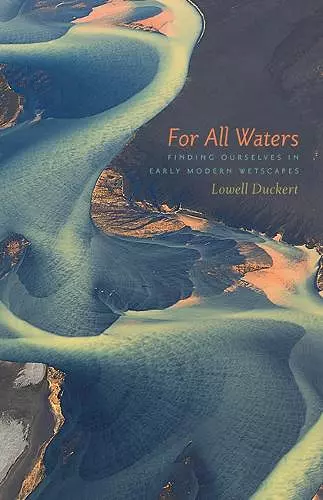For All Waters
Finding Ourselves in Early Modern Wetscapes
Format:Paperback
Publisher:University of Minnesota Press
Published:31st Mar '17
Currently unavailable, and unfortunately no date known when it will be back

Recent years have witnessed a surge in early modern ecostudies, many devoted to Shakespearean drama. Yet in this burgeoning discipline, travel writing appears moored in historicization, inorganic subjects are far less prevalent than organic ones, and freshwater sites are hardly visited. For All Waters explores these uncharted wetscapes.
Lowell Duckert shows that when playwrights and travel writers such as Sir Walter Raleigh physically interacted with rivers, glaciers, monsoons, and swamps, they composed “hydrographies,” or bodily and textual assemblages of human and nonhuman things that dissolved notions of human autonomy and its singular narrativity. With a playful, punning touch woven deftly into its theoretical rigor, For All Waters disputes fantasies of ecological solitude that would keep our selves high and dry and that would try to sustain a political ecology excluding water and the poor. The lives of both humans and waterscapes can be improved simultaneously through direct engagement with wetness.
For All Waters concludes by investigating waterscapes in peril today—West Virginia’s chemical rivers and Iceland’s vanishing glaciers—and outlining what we can learn from early moderns’ eco-ontological lessons. By taking their soggy and storied matters to heart, and arriving at a greater realization of our shared wetness, we can conceive new directions to take within the hydropolitical crises afflicting us today.
"As the ‘hydrological turn’ of literary and cultural studies mixes with traditional green environmentalism and less familiar materialist discourses, early modern studies is entering new waters. With special attention to non-oceanic spaces and non-canonical texts, Lowell Duckert's brilliant and imaginative study makes the case for engaged historicist ecocriticism. In our Anthropocene age of ecological anxieties and catastrophes, Duckert contributes a vision of elemental co-composing that the critical conversation deeply needs."—Steve Mentz, author of Shipwreck Modernity
"A fascinating and creative book tasked with bridging early modernity and today’s global ecological crises in a sound, ethical, and philosophically responsible way." —Renaissance Quarterly
ISBN: 9781517900472
Dimensions: 216mm x 140mm x 38mm
Weight: unknown
312 pages